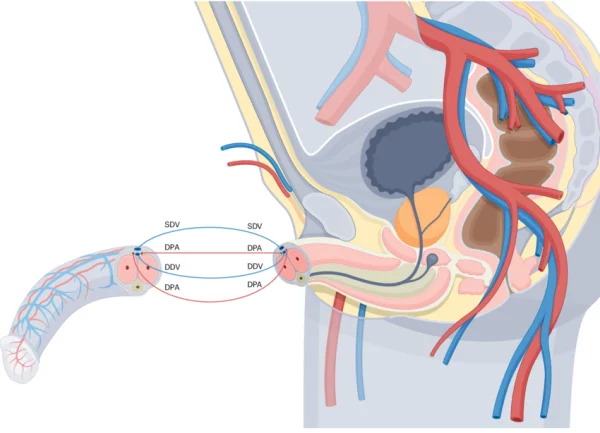The recent successful penile transplant surgery in South Africa marks a major breakthrough in the medical field, sparking new hopes for the restoration of sexual function for patients who have lost their penis due to accidents or medical procedures. This success not only offers hope to patients in similar situations but also demonstrates remarkable advances in the field of transplant surgery, especially as we face technical and ethical challenges in performing such complex surgeries.
This surgery was performed by a team of doctors at Stellenbosch University Hospital in South Africa, led by Dr. André van der Merwe, who is renowned for his achievements in organ transplant surgery. The doctors used microvascular techniques developed in facial transplant surgeries, one of the most precision-demanding procedures. Dr. van der Merwe shared in a report published in the New England Journal of Medicine in 2016, “We applied modern microvascular techniques for connecting blood vessels and nerves, similar to what has been used in previous face transplants.”
An important factor in this surgery is that the patient had lost his penis due to complications following a traditional circumcision procedure. This is a common procedure in many cultures, especially in African countries, but has recently been criticized for the potential medical risks involved. The doctors stated that, in addition to reconnecting blood vessels and nerves, they also had to provide psychological support to the patient during the recovery process, which contributed to the success of the surgery.
Remarkably, the patient fully regained urinary and sexual function after a short period, something medical experts initially did not expect to occur before the end of 2016. This result surpassed all predictions and opened a new door for the treatment of penile loss in the future.
This success is not only meaningful for patients who have lost their penis, but also reflects progress in other areas of medicine, from organ transplantation to the application of advanced microvascular techniques. Doctors and scientists hope that, with these advances, the medical field will be able to offer more treatment opportunities for patients facing similar issues. Furthermore, it serves as a clear example of the potential for developing and applying modern medical technologies to restore vital physiological functions of the body.

Another interesting aspect of this study is that it opens up a new direction in researching and applying advanced medical techniques in transplant surgeries and complex treatments. The success of the surgery not only saved lives and improved the quality of life for the patient, but also created numerous research opportunities in other fields, such as organ transplant surgery and the treatment of physiological and neurological disorders.
“We are not just restoring a part of the body, but also restoring dignity and quality of life for the patient. This is truly a significant step forward in medicine.”
Dr. André van der Merwe, interview on BBC News, December 2016.
These advancements could change the way we view medicine in the future, as technology and techniques continue to evolve, creating almost limitless possibilities for restoring body functions. Scientists, doctors, and specialists are getting closer to the goal of providing effective treatments for complex cases that were once thought to be incurable.
With every successful surgery like this, we not only witness a change in the patient’s life but also see the strong development of science and technology, which serves as clear evidence of the progress we can achieve in healthcare and the restoration of human well-being.


HPX24h > Science > Successful Penis Transplant Surgery: A New Breakthrough in Medical Science
Top Reads from This Category
Science
The First Person to Experience Physical Sensations Through a Prosthetic Hand
Science
Modular Prosthetic Limb Technology: Breakthrough Discovery Enhances Motion for Disabled Individuals
Science
A New Drug Could Treat Depression Within Just 24 Hours
Science
Direct Brain-to-Brain Communication via the Internet
Science
Your Body Is Not the Same as It Was 10 Minutes Ago: The Continuous Regeneration Process of the Human Body
Science
Implanting an NFC Chip into the Hand – When Technology and Humans Merge
Science
The Shocking Truth About Medical Bandages: Harmful Chemicals Absorbed Through Wounds
Discover New Topics
Science
Robot Walker: A Breakthrough in Helping Stroke Survivors Regain Natural Walking
Science
The Mystery of the Brain Network that Regulates Human Attention Has Been Unveiled
Healthy Eating
How Much Protein Do You Need Daily: What’s Sufficient for Your Body
Parenting Tips
Talking To Children About Sexuality: How To Make It Easier?
Animals
Decoding Whale Songs: When the Community Joins to Uncover the Ocean’s Mysteries
Science
Mind-Controlled Prosthetics: A Groundbreaking Advancement in Medicine
Parenting Tips
How to Stop Preschoolers from Putting Everything in Their Mouth?
Science
Gold in the Human Body: A Scientific Look at the ‘Hidden Gold’ Inside You
Fitness
Muscle Strain During Exercise: Effective Prevention and Recovery Tips
Animals
The Secret Behind Turtle Eggs Hatching at the Same Time: A Fascinating Reason
Health
Are ‘Forever Chemicals’ Present in Bandages? How This Could Affect Your Health
Healthy Eating
Ways to Reduce Sugar in Your Diet to Prevent Diabetes
Science
Science Uncovers the Brain’s Process of Storing New Ideas